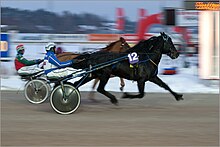Scandinavian Coldblood Trotter
This article needs additional citations for verification. (July 2016) |
 Järvsöfaks, a Coldblood Trotter of mixed Swedish and Norwegian lines | |
| Conservation status | |
|---|---|
| Other names |
|
| Country of origin |
|
| Standard | Det Norske Travselskap |

The Scandinavian Coldblood Trotter consists of two closely related and interconnected breeds of trotting horse: the Norsk Kaldblodstraver or Norwegian Coldblood Trotter and the Svensk Kallblodstravare, the Swedish Coldblood Trotter or North Swedish Trotter. Coldblood trotters are the result of cross-breeding native coldblooded farm horses – in Norway the Dølehest, in Sweden the North Swedish Horse – with lighter and faster horses.[4]: 492 Although the Norwegian and Swedish coldblood trotters are substantially considered a single breed,[5] two national stud-books are maintained, and registration requirements differ in some respects between the two countries.
History
[edit]The Scandinavian Coldblood Trotter is the result of cross-breeding of native coldblooded farm horses – in Norway the Dølehest, in Sweden the North Swedish Horse – with lighter and faster horses.[4]: 492 Stud-books were started in 1939 in Norway and in 1964 in Sweden.[2][3] From about 1950 inter-breeding between the two breeds began,[2] to the point that they are now substantially considered to be a single breed.[5]
Both national types are endangered. In 2012 there were 1464 mares and 100 stallions of the Norwegian breed;[5] by 2019 those numbers had fallen to 764 and 64, for a total breeding stock of 828 head.[2] The corresponding numbers for Sweden in 2019 were 1380 and 180.[3] The conservation status of both is reported to DAD-IS as 'at risk/endangered'.[2][3]
Characteristics
[edit]
The average height at the withers for stallions is 154 cm (15.1 hands), and all individuals should stand at least 148 cm (14.2 hands). Bay in all its variations is the most common coat colour, followed by chestnut and black.[6] The dun gene and cream gene are present in the genetic material, but not white nor any variations of pinto.
The Coldblood Trotter has a relatively small and square head with large nostrils. It is well suited for the cold conditions in Scandanivia, and it can develop large amounts of winter hair, having less need for blankets in winter. Compared to the Standardbred it is smaller, heavier, and more compact in build. It is not as fast as the Standardbred. The Coldblood Trotter is mostly bred in Norway and Sweden. Coldblood Trotters are very rarely found outside the Nordic countries.
Uses
[edit]The coldblood trotter is bred for use in harness racing. The two types compete in shared heats that exclude entry of light trotter breeds or Finnhorses.[citation needed]
References
[edit]- ^ a b Barbara Rischkowsky, Dafydd Pilling (editors) (2007). List of breeds documented in the Global Databank for Animal Genetic Resources, annex to The State of the World's Animal Genetic Resources for Food and Agriculture. Rome: Commission on Genetic Resources for Food and Agriculture, Food and Agriculture Organization of the United Nations. ISBN 9789251057629. Archived 23 June 2020.
- ^ a b c d e Breed data sheet: Norsk kaldblodstraver / Norway (Horse). Domestic Animal Diversity Information System of the Food and Agriculture Organization of the United Nations. Accessed October 2022.
- ^ a b c d Breed data sheet: Kallblodstravare / Sweden (Horse). Domestic Animal Diversity Information System of the Food and Agriculture Organization of the United Nations. Accessed October 2022.
- ^ a b Valerie Porter, Lawrence Alderson, Stephen J.G. Hall, D. Phillip Sponenberg (2016). Mason's World Encyclopedia of Livestock Breeds and Breeding (sixth edition). Wallingford: CABI. ISBN 9781780647944.
- ^ a b c Coldblooded trotter. Nordgen. Archived 3 March 2016.
- ^ Avlsplan for kaldblodshester (in Norwegian). Det Norsk Travselskap. Archived 24 July 2011.
